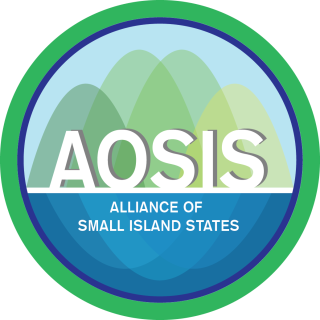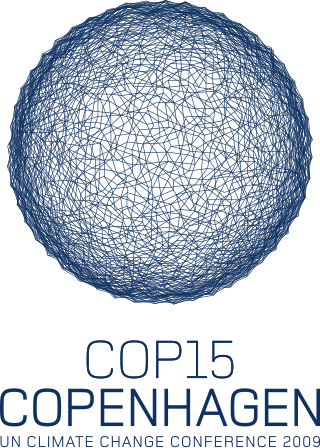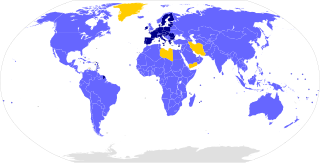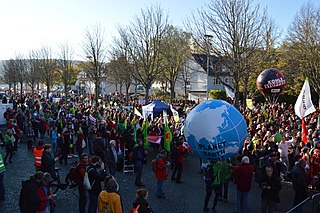Related Research Articles

The United Nations Framework Convention on Climate Change (UNFCCC) is the UN process for negotiating an agreement to limit dangerous climate change. It is an international treaty among countries to combat "dangerous human interference with the climate system". The main way to do this is limiting the increase in greenhouse gases in the atmosphere. It was signed in 1992 by 154 states at the United Nations Conference on Environment and Development (UNCED), informally known as the Earth Summit, held in Rio de Janeiro. The treaty entered into force on 21 March 1994. "UNFCCC" is also the name of the Secretariat charged with supporting the operation of the convention, with offices on the UN Campus in Bonn, Germany.

Alliance of Small Island States (AOSIS) is an intergovernmental organization of low-lying coastal and small island countries. AOSIS was established in 1990, ahead of the Second World Climate Conference. The main purpose of the alliance is to consolidate the voices of Small Island Developing States (SIDS) to address global warming.
Post-Kyoto negotiations refers to high level talks attempting to address global warming by limiting greenhouse gas emissions. Generally part of the United Nations Framework Convention on Climate Change (UNFCCC), these talks concern the period after the first "commitment period" of the Kyoto Protocol, which expired at the end of 2012. Negotiations have been mandated by the adoption of the Bali Road Map and Decision 1/CP.13.

The 2009 United Nations Climate Change Conference, commonly known as the Copenhagen Summit, was held at the Bella Center in Copenhagen, Denmark, between 7 and 18 December. The conference included the 15th session of the Conference of the Parties to the United Nations Framework Convention on Climate Change (UNFCCC) and the 5th session of the Conference of the Parties serving as the Meeting of the Parties to the Kyoto Protocol. According to the Bali Road Map, a framework for climate change mitigation beyond 2012 was to be agreed there.

Karen Christiana Figueres Olsen is a Costa Rican diplomat who has led national, international and multilateral policy negotiations. She was appointed Executive Secretary of the UN Framework Convention on Climate Change (UNFCCC) in July 2010, six months after the failed COP15 in Copenhagen. During the next six years she worked to rebuild the global climate change negotiating process, leading to the 2015 Paris Agreement, widely recognized as a historic achievement.

The Paris Agreement is an international treaty on climate change that was adopted in 2015. The treaty covers climate change mitigation, adaptation, and finance. The Paris Agreement was negotiated by 196 parties at the 2015 United Nations Climate Change Conference near Paris, France. As of February 2023, 195 members of the United Nations Framework Convention on Climate Change (UNFCCC) are parties to the agreement. Of the three UNFCCC member states which have not ratified the agreement, the only major emitter is Iran. The United States withdrew from the agreement in 2020, but rejoined in 2021.

The United Nations Climate Change Conferences are yearly conferences held in the framework of the United Nations Framework Convention on Climate Change (UNFCCC). They serve as the formal meeting of the UNFCCC parties – the Conference of the Parties (COP) – to assess progress in dealing with climate change, and beginning in the mid-1990s, to negotiate the Kyoto Protocol to establish legally binding obligations for developed countries to reduce their greenhouse gas emissions. Starting in 2005 the conferences have also served as the "Conference of the Parties Serving as the Meeting of Parties to the Kyoto Protocol" (CMP); also parties to the convention that are not parties to the protocol can participate in protocol-related meetings as observers. From 2011 to 2015 the meetings were used to negotiate the Paris Agreement as part of the Durban platform, which created a general path towards climate action. Any final text of a COP must be agreed by consensus.

The 2015 United Nations Climate Change Conference, COP 21 or CMP 11 was held in Paris, France, from 30 November to 12 December 2015. It was the 21st yearly session of the Conference of the Parties (COP) to the 1992 United Nations Framework Convention on Climate Change (UNFCCC) and the 11th session of the Meeting of the Parties (CMP) to the 1997 Kyoto Protocol.
The Climate Summit 2014 was a meeting on climate change in New York on September 23, 2014. UN Secretary-General Ban Ki-moon announced it in September 2013 and invited leaders of governments, the private sector, and civil society to unite in taking concrete action towards a low-carbon emission world.

The nationally determined contributions (NDCs) are commitments that countries make to reduce their greenhouse gas emissions as part of climate change mitigation. These commitments include the necessary policies and measures for achieving the global targets set out in the Paris Agreement. The Paris Agreement has a long-term temperature goal which is to keep the rise in global surface temperature to well below 2 °C (3.6 °F) above pre-industrial levels. The treaty also states that preferably the limit of the increase should only be 1.5 °C (2.7 °F). To achieve this temperature goal, greenhouse gas emissions should be reduced as soon as, and by as much as, possible. To stay below 1.5 °C of global warming, emissions need to be cut by roughly 50% by 2030. This figure takes into account each country's documented pledges or NDCs.

The 2016 United Nations Climate Change Conference was an international meeting of political leaders and activists to discuss environmental issues. It was held in Marrakech, Morocco, on 7–18 November 2016. The conference incorporated the twenty-second Conference of the Parties (COP22), the twelfth meeting of the parties to the Kyoto Protocol (CMP12), and the first meeting of the parties to the Paris Agreement (CMA1). The purpose of the conference was to discuss and implement plans about combatting climate change and to "[demonstrate] to the world that the implementation of the Paris Agreement is underway". Participants work together to come up with global solutions to climate change.

The 2017 United Nations Climate Change Conference (COP23) was an international meeting of political leaders, non-state actors and activists to discuss environmental issues. It was held at UN Campus in Bonn, Germany, during 6–17 November 2017. The conference incorporated the 23rd Conference of the Parties to the United Nations Framework Convention on Climate Change (UNFCCC), the thirteenth meeting of the parties for the Kyoto Protocol (CMP13), and the second session of the first meeting of the parties for the Paris Agreement.
The 2018 United Nations Climate Change Conference, more commonly referred to as the Katowice Climate Change Conference or COP24, was the 24th Conference of the Parties to the United Nations Framework Convention on Climate Change. It was held between 2 and 15 December 2018 at the International Congress Centre in Katowice, Poland.
The High Ambition Coalition (HAC) is an informal group of countries within the UN Framework Convention on Climate Change (UNFCCC) committed to advancing progressive proposals on climate ambition. The HAC was founded by the Republic of the Marshall Islands in 2014 with the aim of ensuring the Paris Agreement, adopted in 2015, was as ambitious as possible. The group succeeded in securing the Paris Agreement's most ambitious provisions, including the five year ratchet-up cycles of nationally-determined contributions, as well as language in Article 2 related to pursuing efforts to limit the temperature increase to 1.5 degrees Celsius above pre-industrial levels. The Republic of the Marshall Islands serves as the convener and secretariat of the HAC.

The 2019 United Nations Climate Change Conference, also known as COP25, was the 25th United Nations Climate Change conference. It was held in Madrid, Spain, from 2 to 13 December 2019 under the presidency of the Chilean government. The conference incorporated the 25th Conference of the Parties to the United Nations Framework Convention on Climate Change (UNFCCC), the 15th meeting of the parties to the Kyoto Protocol (CMP15), and the second meeting of the parties to the Paris Agreement (CMA2).

The 2021 United Nations Climate Change Conference, more commonly referred to as COP26, was the 26th United Nations Climate Change conference, held at the SEC Centre in Glasgow, Scotland, United Kingdom, from 31 October to 13 November 2021. The president of the conference was UK cabinet minister Alok Sharma. Delayed for a year due to the COVID-19 pandemic, it was the 26th Conference of the Parties (COP) to the United Nations Framework Convention on Climate Change (UNFCCC), the third meeting of the parties to the 2015 Paris Agreement, and the 16th meeting of the parties to the Kyoto Protocol (CMP16).
The 2019 UN Climate Action Summit was held at the headquarters of the United Nations in New York City on 23 September 2019. The UN 2019 Climate Summit convened on the theme, "Climate Action Summit 2019: A Race We Can Win. A Race We Must Win." The goal of the summit was to further climate action to reduce greenhouse gas emissions to prevent the mean global temperature from rising by more than 1.5 °C (2.7 °F) above preindustrial levels. Sixty countries were expected to "announce steps to reduce emissions and support populations most vulnerable to the climate crisis" including France, a number of other European countries, small island countries and India. To increase pressure on political and economic actors to achieve the aims of the summit, a global climate strike was held around the world on 20 September with over four million participants.

Sustainable Development Goal 13 is to limit and adapt to climate change. It is one of 17 Sustainable Development Goals established by the United Nations General Assembly in 2015. The official mission statement of this goal is to "Take urgent action to combat climate change and its impacts". SDG 13 and SDG 7 on clean energy are closely related and complementary.

The 2021 Leaders' Summit on Climate was a virtual climate summit on April 22–23, 2021, organized by the Joe Biden administration, with leaders from various countries. At the summit Biden announced that greenhouse gas emissions by the United States would be reduced by 50% - 52% relative to the level of 2005 by 2030. Overall, the commitments made at the summit reduce the gap between governments' current pledges and the 1.5 degrees target of the Paris Agreement by 12% - 14%. If the pledges are accomplished, greenhouse gas emissions will fall by 2.6% - 3.7% more in comparison to the pledges before the summit. The results of the summit were described by Climate Action Tracker as a step forward in the fight against climate change.
References
- ↑ Hsu, Angel (21 April 2016). "NAZCA: Track climate pledges of cities and companies" (PDF). Nature. 532 (7599): 303–305. doi:10.1038/532303a. PMID 27111615. S2CID 4459656. Archived (PDF) from the original on 12 May 2024. Retrieved 15 December 2019.
NAZCA is by far the most comprehensive registry of climate actions made below the national level. Already, its business participants account for one-third of the global economy
- ↑ "Global Climate Action Nazca". Global Climate Action Nazca. Archived from the original on 9 October 2019. Retrieved 15 December 2019.
- ↑ "About". Global Climate Action Nazca. Archived from the original on 12 November 2019. Retrieved 15 December 2019.
- ↑ Harvey, Fiona (26 November 2019). "UN calls for push to cut greenhouse gas levels to avoid climate chaos". The Guardian. Archived from the original on 22 January 2020. Retrieved 27 November 2019.
- ↑ "Cut Global Emissions by 7.6 Percent Every Year for Next Decade to Meet 1.5°C Paris Target - UN Report". United Nations Framework Convention on Climate Change. United Nations. Archived from the original on 4 December 2019. Retrieved 27 November 2019.
- ↑ "Global climate action from cities, regions and businesses – 2019". New Climate Institute. Archived from the original on 13 December 2019. Retrieved 15 December 2019.
- ↑ Farland, Chloe (2 October 2019). "This is what the world promised at the UN climate action summit". Climate Home News. Archived from the original on 5 October 2019. Retrieved 15 December 2019.
- ↑ "Global Climate Action Presents a Blueprint for a 1.5-Degree World". UNFCCC. Archived from the original on 15 December 2019. Retrieved 15 December 2019.
- ↑ "Global Data Community Commits to Track Climate Action". UNFCCC. Archived from the original on 19 August 2023. Retrieved 15 December 2019.